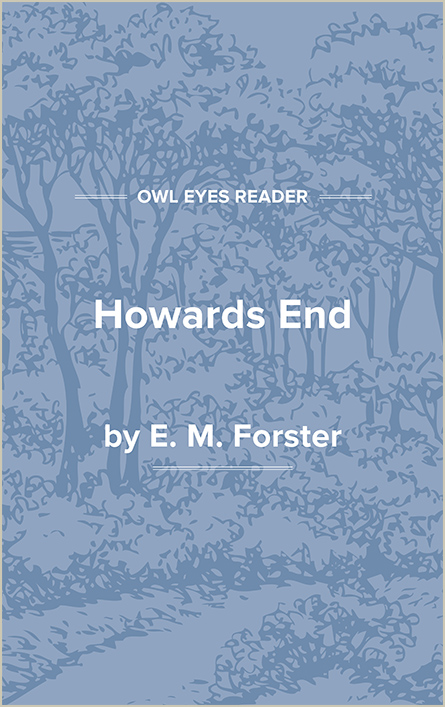Summary
Howards End, sometimes proclaimed as Forster’s most mature novel, uses the country house as a symbol of cultural unity. On the title page of the early editions is the phrase “Only connect.” Forster admonishes humankind that its most significant failure is the reluctance to establish relationships with each other and eliminate the obstacles of prejudice that divide and subjugate individuals. The Schlegels and the Wilcoxes represent two different ways of life. The Schlegels signify culture (“sweetness and light”), and the Wilcoxes represent materialism (acquisitiveness and power). The threat of the “machine in the garden” or the growing materialism in Edwardian England challenges the order of traditional English society. Although the mood of the novel is social comedy, it exhibits the trappings of a novel of manners, and the serious subject of social and political upheaval is implied.
The narrative begins with Helen Schlegel’s letter to her sister Margaret. She writes from Howards End, where she is a guest of the Wilcox family. The Wilcox family had met the Schlegels while both families were vacationing in Germany. Both sisters had been invited to Howards End, but Margaret stays with Tibby, their brother, who is ill. Helen Schlegel falls in love with Paul Wilcox and the Wilcox family, but both families are opposed to the match. In a rather indelicate manner, Helen breaks off her relationship with Paul. In a bumbling rescue by her aunt, Mrs. Munt, Helen returns home. Mrs. Munt breaks every rule of decorum and embarrasses Helen and herself. Soon the Wilcox family rents a flat across the street from the Schlegel home. The Schlegel home is a leasehold property, inherited from their father. At the expiration of the lease, they will have to move. Mrs. Ruth Wilcox and Margaret Schlegel become good friends.
Helen Schlegel accidentally takes an umbrella from Leonard Bast at a concert. This working-class young man intrigues the Schlegel sisters, who do not know of his attachment to Jacky, a woman some years older than Leonard and soon to become his wife.
Shortly after Ruth Wilcox and Margaret Schlegel become friends, Ruth dies. She leaves Howards End to Margaret, much to the dismay of her husband and son. No one tells Margaret of her inheritance since it is not part of the official will. After several years, Helen and Margaret meet Henry Wilcox in the park. Wilcox deliberately misleads them about the stability of the firm for which Leonard Bast works. Wilcox is attracted to Margaret and sees Bast as a possible rival. Unaware of that, the two women advise Bast to change jobs, and he does so.
When the long-term lease on the Schlegel home expires, Margaret receives a letter from Henry Wilcox offering to lease them his house in London. Margaret goes with him to look at the house, and he proposes marriage. In spite of the joint disapproval from the Wilcox and Schlegel families, Margaret accepts his proposal. There is the hope that a union between Henry and Margaret will form a vital bond and facilitate the coalescence of the two different ways of life. Forster writes the following:Mature as he was, she might yet be able to help him to the building of the rainbow bridge that should connect the prose in us with the passion. Without it we are meaningless fragments, half monks, half beasts, unconnected arches that have never joined into a man.
Deprived of experiencing the power of true love, Margaret has expectations that she might be able to bring him to her way of thinking.
After learning that Leonard Bast lost everything he had following the bad advice that Helen and Margaret had given him, Helen believes that Henry Wilcox...
(The entire page is 941 words.)
Owl Eyes subscribers get unlimited access to our expert annotations, analyses, and study guides on your favorite texts. Master the classics for less than $5/month!

